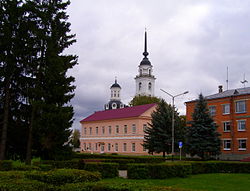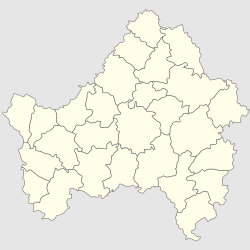Pochep, Bryansk Oblast
Pochep
Почеп | |
|---|---|
 | |
| Coordinates: 52°56′N 33°27′E / 52.933°N 33.450°E | |
| Country | Russia |
| Federal subject | Bryansk Oblast[1] |
| Administrative district | Pochepsky District[2] |
| Urban Administrative Okrug | Pochepsky[2] |
| First mentioned | 15th century |
| Elevation | 150 m (490 ft) |
| Population | |
| • Total | 17,161 |
| • Capital of | Pochepsky District,[1] Pochepsky Urban Administrative Okrug[2] |
| • Municipal district | Pochepsky Municipal District[4] |
| • Urban settlement | Pochepskoye Urban Settlement[4] |
| • Capital of | Pochepsky Municipal District,[4] Pochepskoye Urban Settlement[4] |
| Time zone | UTC+3 (MSK |
| Postal code(s)[6] | 243400, 243402, 243449 |
| Dialing code(s) | +7 48345 |
| OKTMO ID | 15644101001 |
| Website | www |
Pochep (Russian: По́чеп) is a town and the administrative center of Pochepsky District in Bryansk Oblast, Russia, located 84 kilometers (52 mi) southwest of Bryansk, the administrative center of the oblast. Population: 14,991 (2021 Census);[7] 17,161 (2010 Census);[3] 17,064 (2002 Census);[8] 16,868 (1989 Soviet census).[9]
History
[edit]
Poland–Lithuania 15th cent.–1503
Grand Duchy of Moscow 1503–1547
Tsardom of Russia 1547–1618
Polish–Lithuanian Commonwealth 1618–1667
Tsardom of Russia 1667–1721
Russian Empire 1721–1917
Ukrainian People's Republic 1917-1918
Soviet Russia 1918–1922
Soviet Union 1922–1991
Russian Federation 1991–present
The origin of Pochep is unknown but it was mentioned in the 15th century as an important town of the Grand Duchy of Lithuania.[citation needed] It fell into the hands of the Grand Duchy of Moscow in 1503. Pochep was returned to the Polish–Lithuanian Commonwealth under the terms of the Truce of Deulino. It was part of the Smolensk Voivodeship. Pochep remained of little significance until 1709, when Hetman Ivan Skoropadsky made a grant of it to Alexander Menshikov. The latter founded the fort of Alexandropolis in the vicinity and launched manufacture of sails for Russian ships in Pochep.
The industry declined following Menshikov's downfall and the town stagnated until 1750, when it passed to another Hetman, Kirill Razumovsky, who planned to build his summer residence there. The only monument to these plans is the Resurrection Church, built in the 1750s to a confident Baroque design and often attributed to Antonio Rinaldi.[citation needed]

During World War II, Pochep was occupied by the German Army from August 22, 1941 to September 21, 1943. According to the Soviet archives, 1,875 Jews, including men, women, and children, were murdered during the Holocaust, mainly in the shootings of March 1942.[10]
Administrative and municipal status
[edit]Within the framework of administrative divisions, Pochep serves as the administrative center of Pochepsky District.[1] As an administrative division, it is incorporated within Pochepsky District as Pochepsky Urban Administrative Okrug.[2] As a municipal division, Pochepsky Urban Administrative Okrug is incorporated within Pochepsky Municipal District as Pochepskoye Urban Settlement.[4]
Notable people
[edit]- Pavel Axelrod, Russian Menshevik, was born here in 1850.
- Matvey Blanter, Russian composer, famous for the song "Katyusha", was born here in 1903.
- Roman Konoplev, Russian politician and publicist, was born here in 1973.
See also
[edit]References
[edit]Notes
[edit]- ^ a b c d Law #13-Z
- ^ a b c d Law #69-Z
- ^ a b Russian Federal State Statistics Service (2011). Всероссийская перепись населения 2010 года. Том 1 [2010 All-Russian Population Census, vol. 1]. Всероссийская перепись населения 2010 года [2010 All-Russia Population Census] (in Russian). Federal State Statistics Service.
- ^ a b c d e Law #3-Z
- ^ "Об исчислении времени". Официальный интернет-портал правовой информации (in Russian). June 3, 2011. Retrieved January 19, 2019.
- ^ Почта России. Информационно-вычислительный центр ОАСУ РПО. (Russian Post). Поиск объектов почтовой связи (Postal Objects Search) (in Russian)
- ^ Russian Federal State Statistics Service. Всероссийская перепись населения 2020 года. Том 1 [2020 All-Russian Population Census, vol. 1] (XLS) (in Russian). Federal State Statistics Service.
- ^ Federal State Statistics Service (May 21, 2004). Численность населения России, субъектов Российской Федерации в составе федеральных округов, районов, городских поселений, сельских населённых пунктов – районных центров и сельских населённых пунктов с населением 3 тысячи и более человек [Population of Russia, Its Federal Districts, Federal Subjects, Districts, Urban Localities, Rural Localities—Administrative Centers, and Rural Localities with Population of Over 3,000] (XLS). Всероссийская перепись населения 2002 года [All-Russia Population Census of 2002] (in Russian).
- ^ Всесоюзная перепись населения 1989 г. Численность наличного населения союзных и автономных республик, автономных областей и округов, краёв, областей, районов, городских поселений и сёл-райцентров [All Union Population Census of 1989: Present Population of Union and Autonomous Republics, Autonomous Oblasts and Okrugs, Krais, Oblasts, Districts, Urban Settlements, and Villages Serving as District Administrative Centers]. Всесоюзная перепись населения 1989 года [All-Union Population Census of 1989] (in Russian). Институт демографии Национального исследовательского университета: Высшая школа экономики [Institute of Demography at the National Research University: Higher School of Economics]. 1989 – via Demoscope Weekly.
- ^ "Yahad - in Unum".
Sources
[edit]- Брянская областная Дума. Закон №13-З от 5 июня 1997 г. «Об административно-территориальном устройстве Брянской области», в ред. Закона №4-З от 5 февраля 2014 г. «О внесении изменений в отдельные законодательные акты Брянской области». Опубликован: "Брянский рабочий", №119, 24 июня 1997 г. (Bryansk Oblast Duma. Law #13-Z of June 5, 1997 On the Administrative-Territorial Structure of Bryansk Oblast, as amended by the Law #4-Z of February 5, 2014 On Amending Various Legislative Acts of Bryansk Oblast. ).
- Брянская областная Дума. Закон №69-З от 2 ноября 2012 г. «Об образовании городских административных округов, поселковых административных округов, сельских административных округов, установлении границ, наименований и административных центров административных округов в Брянской области». Вступил в силу 1 января 2013 г. Опубликован: Информационный бюллетень "Официальная Брянщина", №16, 6 ноября 2012 г.. (Bryansk Oblast Duma. Law #69-Z of November 2, 2002 On the Establishment of Urban Administrative Okrugs, Settlement Administrative Okrugs, Rural Administrative Okrugs, on Establishing Borders, Names, and Administrative Centers of the Administrative Okrugs of Bryansk Oblast. Effective as of January 1, 2013.).
- Брянская областная Дума. Закон №3-З от 9 марта 2005 г. «О наделении муниципальных образований статусом статусом городского округа, муниципального района, городского поселения, сельского поселения и установлении границ муниципальных образований в Брянской области», в ред. Закона №75-З от 28 сентября 2015 г. «Об изменении статуса населённого пункта посёлок Красный Ятвиж Клетнянского района Брянской области». Вступил в силу через 10 дней после официального опубликования. Опубликован: "Брянская неделя", №13, 8 апреля 2005 г. (Bryansk Oblast Duma. Law #3-Z of March 9, 2005 On Granting the Municipal Formations the Status of Urban Okrug, Municipal District, Urban Settlement, Rural Settlement and on Establishing the Borders of the Municipal Formations of Bryansk Oblast, as amended by the Law #75-Z of September 28, 2015 On Changing the Status of the Inhabited Locality the Settlement of Krasny Yatvizh in Kletnyansky District of Bryansk Oblast. Effective as of the day which is 10 days after the official publication.).
External links
[edit]- The murder of the Jews of Pochep during World War II, at Yad Vashem website.




